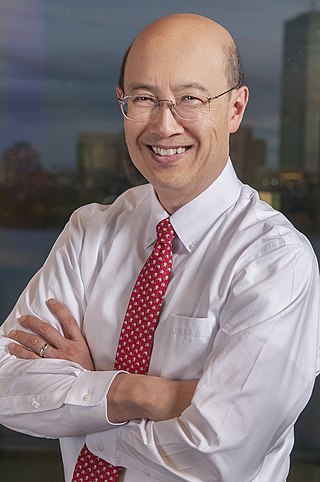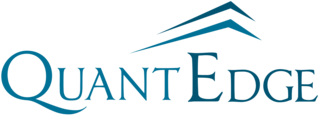Related Research Articles
Finance refers to monetary resources and to the study and discipline of money, currency, assets and liabilities. As a subject of study, it is related to but distinct from economics, which is the study of the production, distribution, and consumption of goods and services. Based on the scope of financial activities in financial systems, the discipline can be divided into personal, corporate, and public finance.
A hedge fund is a pooled investment fund that holds liquid assets and that makes use of complex trading and risk management techniques to improve investment performance and insulate returns from market risk. Among these portfolio techniques are short selling and the use of leverage and derivative instruments. In the United States, financial regulations require that hedge funds be marketed only to institutional investors and high-net-worth individuals.

Soros Fund Management, LLC is a privately held American investment management firm. It is currently structured as a family office, but formerly as a hedge fund. The firm was founded in 1970 by George Soros and, in 2010, was reported to be one of the most profitable firms in the hedge fund industry, averaging a 20% annual rate of return over four decades. It is headquartered at 250 West 55th Street in New York. As of 2023, Soros Fund Management, LLC had $25 billion in AUM.
Alpha is a measure of the active return on an investment, the performance of that investment compared with a suitable market index. An alpha of 1% means the investment's return on investment over a selected period of time was 1% better than the market during that same period; a negative alpha means the investment underperformed the market.
Chartered Alternative Investment Analyst (CAIA) is a professional designation offered by the CAIA Association to investment professionals who complete a course of study and pass two examinations. The "alternative investments" industry is characterized as dealing with asset classes and investments other than standard equity or fixed income products. Alternative investments can include hedge funds, private equity, real assets, commodities, and structured products.

Bridgewater Associates, LP is an American investment management firm founded by Ray Dalio in 1975. The firm serves institutional clients including pension funds, endowments, foundations, foreign governments, and central banks. As of 2022, Bridgewater has posted the second highest gains of any hedge fund since its inception in 1975. The firm began as an institutional investment advisory service, graduated to institutional investing, and pioneered the risk parity investment approach in 1996.
An investment strategy or portfolio is considered market-neutral if it seeks to avoid some form of market risk entirely, typically by hedging. To evaluate market neutrality requires specifying the risk to avoid. For example, convertible arbitrage attempts to fully hedge fluctuations in the price of the underlying common stock. A portfolio is truly market-neutral if it exhibits zero correlation with the unwanted source of risk. Market neutrality is an ideal, which is seldom possible in practice. A portfolio that appears market-neutral may exhibit unexpected correlations as market conditions change. The risk of this occurring is called basis risk.
The absolute return or simply return is a measure of the gain or loss on an investment portfolio expressed as a percentage of invested capital. The adjective "absolute" is used to stress the distinction with the relative return measures that are based on comparison to a benchmark.
Alternative beta is the concept of managing volatile "alternative investments", often through the use of hedge funds. Alternative beta is often also referred to as "alternative risk premia".

An alternative investment, also known as an alternative asset or alternative investment fund (AIF), is an investment in any asset class excluding capital stocks, bonds, and cash.
A 130–30 fund or a ratio up to 150/50 is a type of collective investment vehicle, often a type of specialty mutual fund, but which allows the fund manager simultaneously to hold both long and short positions on different equities in the fund. Traditionally, mutual funds were long-only investments. 130–30 funds are a fast-growing segment of the financial industry; they should be available both as traditional mutual funds, and as exchange-traded funds (ETFs). While this type of investment has existed for a while in the hedge fund industry, its availability for retail investors is relatively new.
In alternative investments, operational due diligence (ODD), is an investigation (due diligence) into operational factors of alternative investment entities such as a hedge fund, private equity fund, or infrastructure fund.
The bias ratio is an indicator used in finance to analyze the returns of investment portfolios, and in performing due diligence.

Andrew Wen-Chuan Lo is a Hong Kong-born Taiwanese-American economist and academic who is the Charles E. and Susan T. Harris Professor of Finance at the MIT Sloan School of Management. Lo is the author of many academic articles in finance and financial economics. He founded AlphaSimplex Group in 1999 and served as chairman and chief investment strategist until 2018 when he transitioned to his current role as chairman emeritus and senior advisor.
A quantitative fund is an investment fund that uses quantitative investment management instead of fundamental human analysis.
Hedge fund replication is the collective name given to a number of different methods that attempt to replicate hedge fund returns. The hedge fund industry has boomed over recent years and various studies by investment banks as well as academic papers have shown that hedge funds may be nearing an alpha generating capacity constraint. This means hedge funds can no longer produce alpha in aggregate. Replication has been claimed to remove the illiquidity, transparency and fraud risk associated with direct investment in hedge funds. With the belief that the pursuit of alpha is a zero-sum game, more investors are looking to simply add "Hedge Fund Beta" to their portfolio. These early investors have been rewarded as the replicators outperformed their direct investment cousins in 2008 due to their greater liquidity and lower use of leverage.

Quantedge Capital is an alternative investment asset manager based in Singapore and New York City. It manages over US$3 billion under its flagship Quantedge Global Master Fund primarily on behalf of high-net-worth individuals, family offices and institutions.
The Standards Board for Alternative Investments (SBAI), formerly known as the Hedge Fund Standards Board, is an international standard-setting body for the alternative investment industry and sets the voluntary standard of best practices and practices endorsed by its members. Its primary role is to be the custodian of the Alternative Investment Standards, which are designed to create a "framework of transparency, integrity and good governance" in the way the hedge fund industry operates.

Jeffrey Glynn Tarrant was an American investor. He was the founder and chairman of MOV37 and Protégé Partners, firms specializing in identifying, seeding and early stage investing in investment funds. He was also a founding partner of film production company Candescent Films. He died from brain cancer in 2019.

Geode Capital Management, LLC (Geode) is an American investment management firm based in Boston, Massachusetts.
References
- ↑ "Interview Lars Jäger". Schweizer Fernsehen: SF Videoportal (in German). Archived from the original on 2017-02-04.
- ↑ "Lars Jäger über die Eigendynamik der CDS - Schweizer Fernsehen: SF Videoportal" (in German)
- ↑ "Dr. Lars Jaeger on Hedge Fund Replication and Alternative Beta - Opalesque.TV Part 1"
- ↑ "Dr. Lars Jaeger on Hedge Fund Replication and Alternative Beta - Opalesque.TV Part 2"
- ↑ "Dr. Lars Jaeger on Hedge Fund Replication and Alternative Beta - Opalesque.TV Part 3"
- ↑ "Lars Jaeger on Wiley Finance "
- ↑ "Transparency/liquidity needs of alternative invest". IPE (pension fund magazine). November 2001. Archived from the original on 2017-02-04.
- ↑ "2000 Article on risk management for hedge fund portfolios" [ permanent dead link ]
- ↑ "2002 Interview "
- ↑ "2006 Article in Garp Risk Review", GARP Risk Review , Archived 2013-04-15 at archive.today
- ↑ "The Risk in Hedge Fund Strategies: Alternative Alphas and Alternative Betas," David Hsieh, Bill Fung, in Lars Jaeger (ed.), The New Generation of Risk Management for Hedge Funds and Private Equity Funds, London: Euromoney Institutional Investors PLC, 2003, 72-87"
- ↑ such as "Factor Modeling and Benchmarking of Hedge Funds: Can passive investments in hedge funds strategies deliver?"
- ↑ "EDHEC Risk Climate Impact Institute". climateimpact.edhec.edu. Retrieved 2023-02-04.
- ↑ Walter Géhin (April 2007). "Hedge Fund Replication and Industry Initiatives: Clones or Hybrid Products?". eurekahedge.com. Retrieved 2022-11-30.
- ↑ "Portfolio for the Future | CAIA". caia.org. Retrieved 2023-02-04.
- ↑ "Factor Modeling and Benchmarking of Hedge Funds: Can passive investments in hedge funds strategies deliver?"
- ↑ Jaeger, Lars (2015). Die Naturwissenschaften: Eine Biographie. doi:10.1007/978-3-662-43400-0. ISBN 978-3-662-43399-7.
- ↑ Jaeger, Lars (2017). Wissenschaft und Spiritualität. doi:10.1007/978-3-662-50284-6. ISBN 978-3-662-50283-9.
- ↑ "Supermacht Wissenschaft - Unsere Zukunft zwischen Himmel und Hölle"
- ↑ Jaeger, Lars (2018). The Second Quantum Revolution. doi:10.1007/978-3-319-98824-5. ISBN 978-3-319-98823-8.
- ↑ "Mehr Zukunft wagen - Wie wir alle vom Fortschritt profitieren"
- ↑ "Sternstunden der Wissenschaft. Eine Erfolgsgeschichte des Denkens"
- ↑ Jaeger, Lars (2021). Ways Out of the Climate Catastrophe. doi:10.1007/978-3-030-85132-3. ISBN 978-3-030-85131-6.
- ↑ Jaeger, Lars (2022). The Stumbling Progress of 20th Century Science. doi:10.1007/978-3-031-09618-1. ISBN 978-3-031-09617-4.
- ↑ "Emmy Noether - Her rocky Path to the topf of Mathematics"
- ↑ The Stumbling Progress of 20th Century Science - How Crises and Great Minds Have Shaped Our Modern World
- ↑ Emmy Noether. Ihr steiniger Weg an die Weltspitze der Mathematik
- ↑ Ways Out of the Climate Catastrophe - Ingredients for a Sustainable Energy and Climate Policy
- ↑ "Sternstunden der Wissenschaft. Eine Erfolgsgeschichte des Denkens"
- ↑ " Mehr Zukunft wagen! - Wie wir alle vom Fortschritt profitieren"
- ↑ " The Second Quantum Revolution - From Entanglement to Quantum Computing and Other Super-Technologies"
- ↑ " SUPERMACHT WISSENSCHAFT – Unsere Zukunft zwischen Himmel und Hölle"
- ↑ " Wissenschaft und Spiritualität: Universum, Leben, Geist – Zwei Wege zu den großen Geheimnissen"
- ↑ " Die Naturwissenschaften – Eine Biographie "
- ↑ "Risk Management of Alternative Investment Strategies (Financial Times Prentice Hall, 2002)"
- ↑ "The New Generation of Risk Management for Hedge Funds and Private Equity (Euromoney, 2003)"
- ↑ " Through the Alpha Smokescreen: A guide to hedge fund return sources (Institutional Investors, 2005; second edition 2012)"
- ↑ "Alternative Beta Strategies and Hedge Fund Replication (Wiley, 2008)"